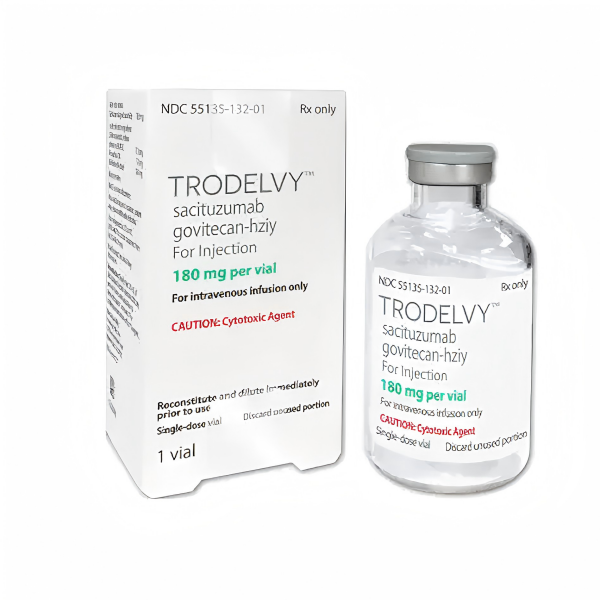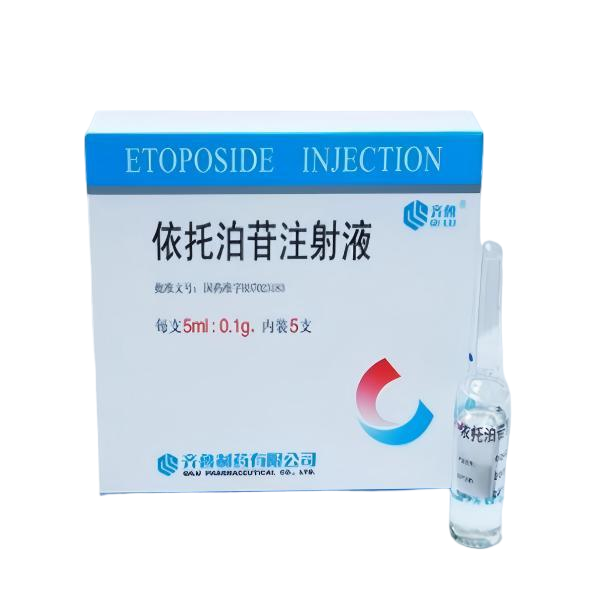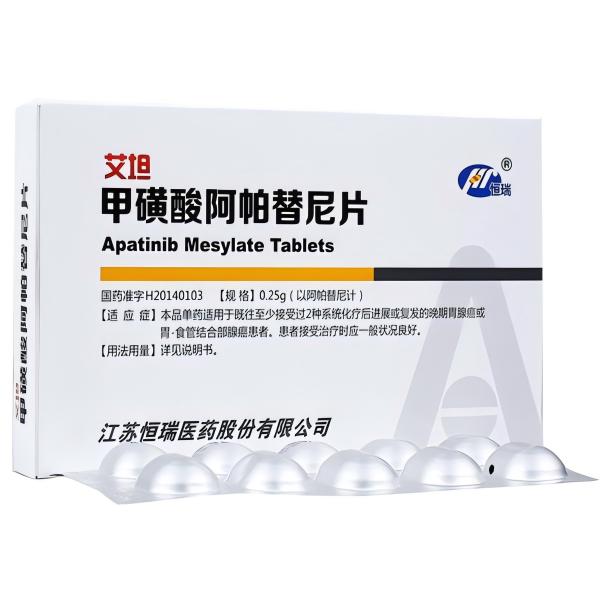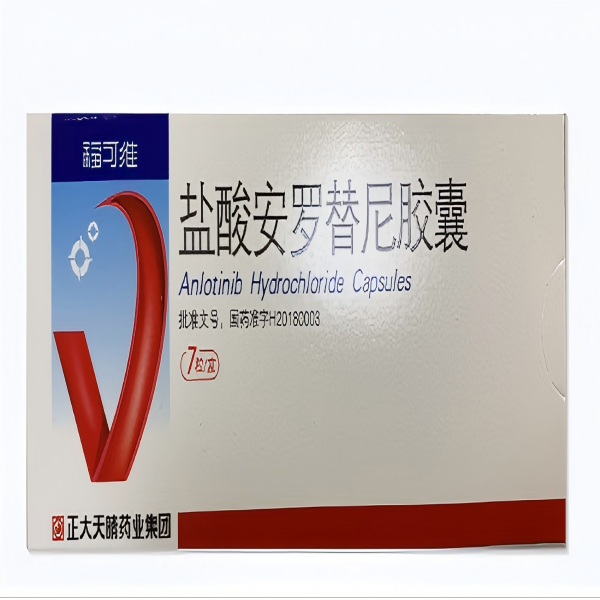

Anlotinib Hydrochloride Capsules
CTTQ PHARMA
Quick Info
Anlotinib is a new small molecule tyrosine kinase inhibitor of multi-targets, which acts effectively on targets such as VEGFR, PDGFR, FGFR and c-Kit. It has double actions that can resist new angiogenesis and inhibit tumor growth. Proven by clinical trials, FOCUS V® is currently the only single-drug effective oral preparation among the advanced non-small cell lung cancer (“NSCLC”) anti-angiogenic targeted drugs with less adverse reactions and satisfactory drug tolerance of patients. FOCUS V® may become a standard drug of third-line treatment for advanced NSCLC.
[Ingredients]
The active ingredient of this product is anlotinib hydrochloride.
Chemical name: 1-[[[4-(4-fluoro-2-methyl-1H-indol-5-yl)oxy-6-methoxyquinolin-7-yl]oxy]methyl]cyclopropylamine
Dihydrochloride.
[Indications]
1. For the treatment of patients with locally advanced or metastatic non-small cell lung cancer who have progressed or relapsed after at least two systemic chemotherapy regimens. For patients with epidermal growth factor receptor (EGFR) gene mutations or anaplastic lymphoma kinase (ALK) positive, they should have progressed after receiving corresponding standard targeted drug treatment and have progressed or relapsed after at least two systemic chemotherapy regimens before starting treatment with this product.
2. For the treatment of patients with alveolar soft tissue sarcoma, clear cell sarcoma, and other advanced soft tissue sarcomas who have progressed or relapsed after at least anthracycline-containing chemotherapy regimens.
3. For the treatment of patients with small cell lung cancer who have progressed or relapsed after at least two chemotherapy regimens.
4. For the treatment of patients with unresectable locally advanced or metastatic medullary thyroid cancer with clinical symptoms or clear disease progression.
This indication was conditionally approved based on the results of a Phase IIB clinical trial involving 91 patients with advanced medullary thyroid cancer. Full approval of this indication will depend on ongoing confirmatory trials confirming the clinical benefit of this product in this population.
(See [Clinical Trials])
5. For patients with progressive, locally advanced or metastatic radioactive iodine-refractory differentiated thyroid cancer.
6. This product is used in combination with bemosubizumab injection, carboplatin and etoposide for the first-line treatment of patients with extensive-stage small cell lung cancer (ES-SCLC).
Calculated as anlotinib (C23H22FN3O3): (1) 12 mg; (2) 10 mg; (3) 8 mg.
This product should be used under the guidance of a physician with experience in the use of anti-tumor drugs.
(1) Recommended dose and method of administration
The recommended dose of anlotinib hydrochloride is 12 mg once a day, orally before breakfast. Take the drug continuously for 2 weeks and stop for 1 week, that is, 3 weeks (21 days) as a course of treatment. Until the disease progresses or intolerable adverse reactions occur. During medication, if a dose is missed, confirm that the next dose is less than 12 hours away, then no more doses will be taken.
(2) Dose adjustment
During the use of this product, adverse reactions should be closely monitored and adjusted according to the adverse reactions so that the patient can tolerate the treatment. Adverse reactions caused by this product can be treated by symptomatic treatment, suspension of medication and/or dose adjustment. According to the degree of adverse reactions, it is recommended to adjust the dose under the guidance of a physician: ① The first dose adjustment: 10 mg, once a day, for 2 consecutive weeks, and then stop for 1 week; ② The second dose adjustment: 8 mg, once a day, for 2 consecutive weeks, and then stop for 1 week (for the dose adjustment method, please refer to Tables 1~2 and [Precautions]). If the 8 mg dose is still not tolerated, the drug should be permanently discontinued. When non-hemorrhagic adverse reactions occur, the dose should first be adjusted according to the general principles of Table 1. When bleeding adverse reactions occur, the dose should be adjusted according to Table 2.
This manual describes the adverse reactions observed in clinical trials that are judged to be possibly caused by anlotinib and their incidence rates. Adverse reactions include adverse events that are judged by researchers to be definitely related, probably related, possibly related, possibly unrelated, and undetermined to anlotinib. Since clinical trials are not conducted under the same conditions, the incidence of adverse reactions observed in one clinical trial should not be directly compared with the incidence of adverse reactions observed in other clinical trials, and may not accurately predict the actual incidence in clinical practice.
Medicine

Sacituzumab Govitecan for Injection
Triple negative breast cancer, HR positive, HER2 negative breast cancer

Etoposide Injection
Mainly used to treat small cell lung cancer, malignant lymphoma, malignant germ cell tumor, leukemia, neuroblastoma, rhabdomyosarcoma, ovarian cancer, non-small...
1-1.png)
Sintilimab Injection
Classical Hodgkin's lymphoma, Non-squamous non-small cell lung cancer, Squamous non-small cell lung cancer, Hepatocellular carcinoma, Esophageal squamous cell carcinoma, Gastric...

Apatinib Mesylate Tablets
This product is suitable for patients with advanced gastric adenocarcinoma or gastroesophageal junction adenocarcinoma who have progressed or relapsed after...
Related News

China’s Innovative Drugs Go Global: From Followers to Game Changers

China’s innovative drugs gain momentum in global expansion efforts

Virtual mental health care visits: Making them work for youChinese-made new drugs big hit overseasVirtual mental health care visits: Making them work for you

Accelerating Chinese Innovative Drugs Going Global: International New Drug R&D Regulation Forum Successfully Held



